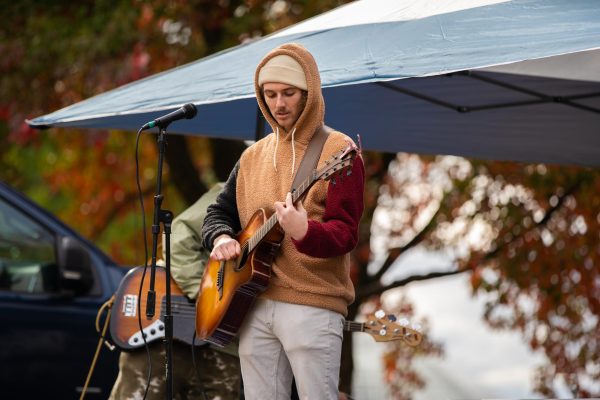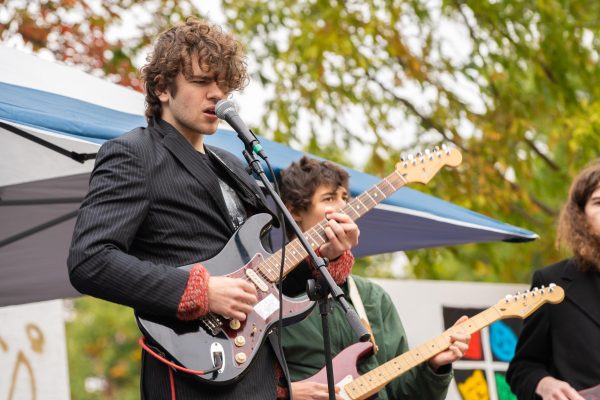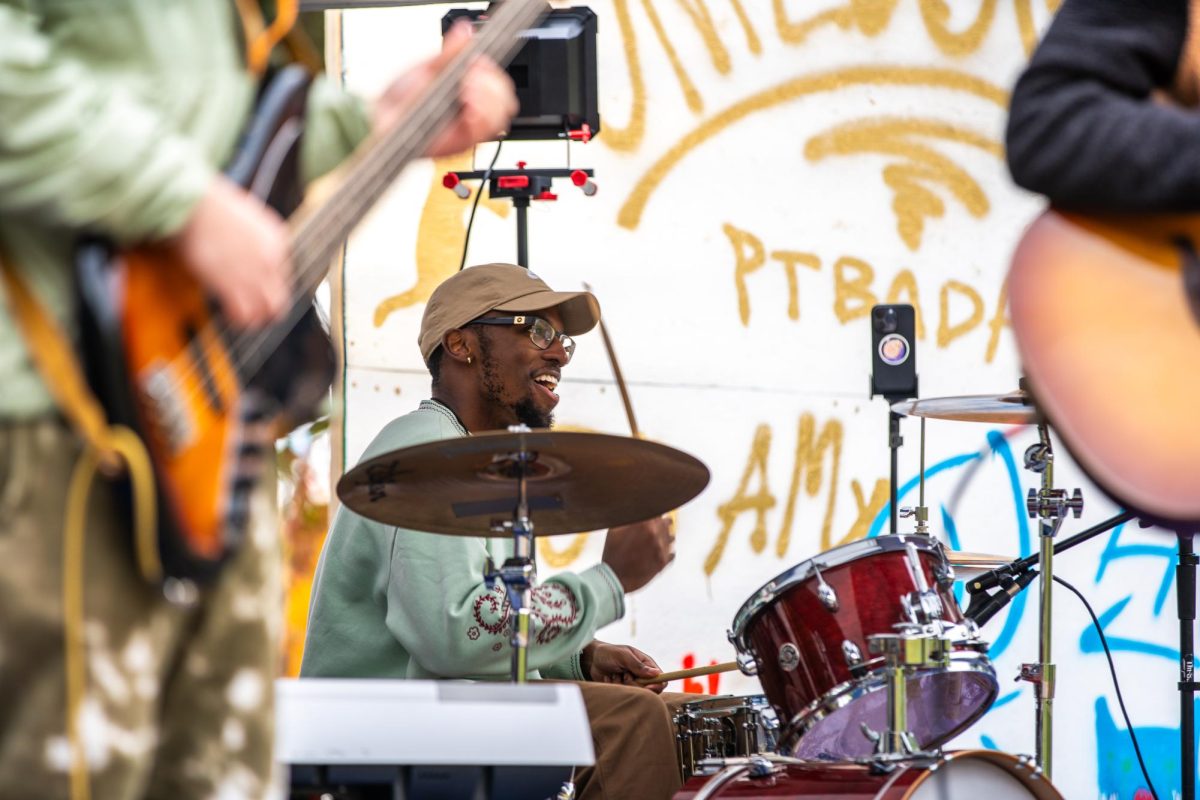Audience members dotting Flagstaff Hill in Schenley Park on Saturday night glowed below neon lights while swaying to the sound of local Pittsburgh bands. The Unplugged Initiative, a new organization aiming to connect people through digital and in-person musical experiences, hosted the ten-hour concert on the afternoon and evening of Oct. 21.
Student bands like Getaway Driver, Wild Blue Yonder, Sunset Drive, Pitter Patter and 9FiftySeven braved light rain and frigid wind to play laid-back and energetic music from noon to 10 p.m. The bands played on a patch of concrete near the bottom of the hill in front of a backdrop of graffitied white slabs and a vinyl tent. The sounds of the speakers echoed through Schenley as dozens of listeners drifted through the park to hear the bands’ sets throughout the day.
Rory Monaghan, a junior neuroscience and psychology major, founded Unplugged and organized the event in support of the Humane Animal Rescue, a non-profit organization dedicated to the welfare of animals. He got started in the Oakland music scene by helping host shows at Black Lodge, a South Oakland house venue, and decided to create Unplugged to make Oakland music more accessible.
“It’s trying to increase accessibility to everything DIY, everything music, everything artistic. We have a bunch of mini docs coming out, interviews with bands, and it’s just basically about how they got started in music. [Unplugged] is going to be creating a concise user guide as to how to use Oakland to your personal advantage,” Monaghan said.

The process to host an event like the Schenley concert was long, and involved obtaining a city permit, insurance, generators and sound and lighting equipment — but it’s not as complex as most people think, Monaghan said. He said he wants to use Unplugged to share that the process is “surprisingly easy.”
“One hundred percent, anyone can do this. I’m not special just because I took the time to do it. It stressed me out, it’s hard, it’s not a guaranteed success, but the fact that more young people don’t go out and make something real when the opportunity is there is just unfortunate,” Monaghan said. “On a glass half full note, it’s kind of crazy what we can actually do in Oakland.”
Ben Orr, a junior information sciences major, plays guitar in the band Funky Lamp, one of the nine bands that performed at Saturday’s show and a student opener for COIN at Fall Fest. He started playing guitar in his junior year of high school and formed Funky Lamp as soon as he got to Pitt. He said the passion within the Oakland music scene is incredible.
“There’s a lot of ambitious people. Especially outside of the bands, the people who are putting the shows together have a lot of amazing goals for the music scene as a whole,” Orr said. “It’s really a symbiotic relationship between the bands and promoters and venues and photographers and everybody is in it to grow the same environment. As a musician it’s beautiful, but for everybody who likes music and is involved somehow, even as a listener, it’s really cool.“
According to Orr, the Pittsburgh music scene has been largely underground compared to the 1960s and 70s. He’s hoping that as Unplugged and Post-Genre, another student-founded live music organization, host more events, appreciation for the music scene will grow too.
“As the music scene becomes more above ground here, we can start being on the map again for touring artists and other music to come through. I think it’ll just bounce off itself and grow,” Orr said.

John Rust, a sophomore political science major at Case Western Reserve University, provided the sound equipment for the Unplugged event in partnership with Case Western fraternity Sigma Nu. Rust, who has contributed to past Oakland concerts, said he wants to preserve the diversity of sound in the Pittsburgh music scene.
“The biggest issue with music nowadays is that it has gone so mainstream – you don’t get the chance to see quite the diversity in sound that you used to see,” Rust said. “With all the bands you see here, they aren’t afraid to experiment and break out from mainstream music. You need to have more artists breaking out from mainstream music and more people exposed to that.”
Rust said he hopes the intimate settings of local concerts will bolster connections between bands and their audiences in Pittsburgh.
“I’ve seldom experienced going to a concert and meeting the artist that was writing and producing their own music. I feel like it’s much more important to understand the personal aspect behind why you’re doing the things you’re doing,” Rust said. “This provides a chance for artists to express themselves and for people to notice and appreciate that self expression without feeling like they have to follow that mainstream line of music. That’s really important.”
As for the future of Unplugged, Monaghan’s planning on hosting shows in New York and Boston with friends from universities like Columbia, Tufts and Harvard. He wants the shows to encourage real-life interaction among students and music lovers.
“The reason that I called the project Unplugged is because we need technology to facilitate scenes like this now,” Monaghan said. “But when we actually get to get off the screen and benefit from the fruits of our digital labor, and be real people interacting in the moment like this, that’s what makes this all worth it.”



